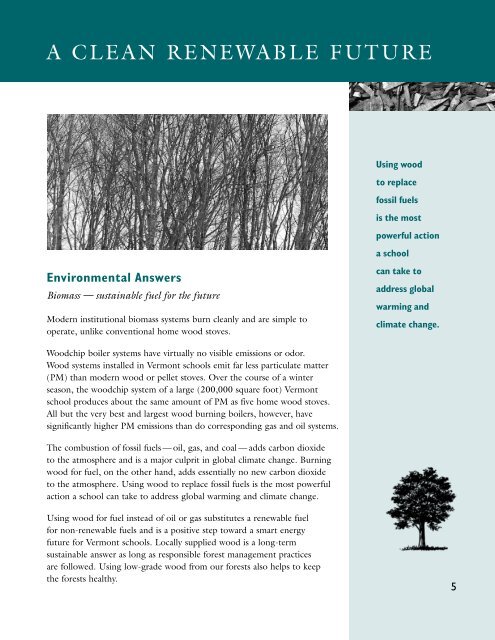Vermont Fuels For Schools Initiative - Biomass Energy Resource ...
Vermont Fuels For Schools Initiative - Biomass Energy Resource ...
Vermont Fuels For Schools Initiative - Biomass Energy Resource ...
You also want an ePaper? Increase the reach of your titles
YUMPU automatically turns print PDFs into web optimized ePapers that Google loves.
A CLEAN RENEWABLE FUTURE<br />
Using wood<br />
to replace<br />
fossil fuels<br />
is the most<br />
powerful action<br />
a school<br />
Environmental Answers<br />
<strong>Biomass</strong> — sustainable fuel for the future<br />
Modern institutional biomass systems burn cleanly and are simple to<br />
operate, unlike conventional home wood stoves.<br />
can take to<br />
address global<br />
warming and<br />
climate change.<br />
Woodchip boiler systems have virtually no visible emissions or odor.<br />
Wood systems installed in <strong>Vermont</strong> schools emit far less particulate matter<br />
(PM) than modern wood or pellet stoves. Over the course of a winter<br />
season, the woodchip system of a large (200,000 square foot) <strong>Vermont</strong><br />
school produces about the same amount of PM as five home wood stoves.<br />
All but the very best and largest wood burning boilers, however, have<br />
significantly higher PM emissions than do corresponding gas and oil systems.<br />
The combustion of fossil fuels — oil, gas, and coal — adds carbon dioxide<br />
to the atmosphere and is a major culprit in global climate change. Burning<br />
wood for fuel, on the other hand, adds essentially no new carbon dioxide<br />
to the atmosphere. Using wood to replace fossil fuels is the most powerful<br />
action a school can take to address global warming and climate change.<br />
Using wood for fuel instead of oil or gas substitutes a renewable fuel<br />
for non-renewable fuels and is a positive step toward a smart energy<br />
future for <strong>Vermont</strong> schools. Locally supplied wood is a long-term<br />
sustainable answer as long as responsible forest management practices<br />
are followed. Using low-grade wood from our forests also helps to keep<br />
the forests healthy.<br />
5





